College Fed Challenge
Babson Economics Team Earns Honorable Mention at Boston Regional College Fed Challenge
November 11, 2025
Babson College and a team of economics students earned an honorable mention at the regional finals of the 2025 Boston Regional College Fed Challenge competition last month at the Federal Reserve Bank of Boston.
The Babson team, coached by Associate Professor Josh Staveley-O’Carroll, defeated the University of Connecticut, Framingham State University, and Southern Connecticut State University in the first round October 24. The team then earned the honorable mention recognition in the regional finals against Harvard (first place), Yale (second place), Northeastern (third place), Bentley, and Boston University. This is the fourth time in the past seven years that Babson has advanced to the regional finals.
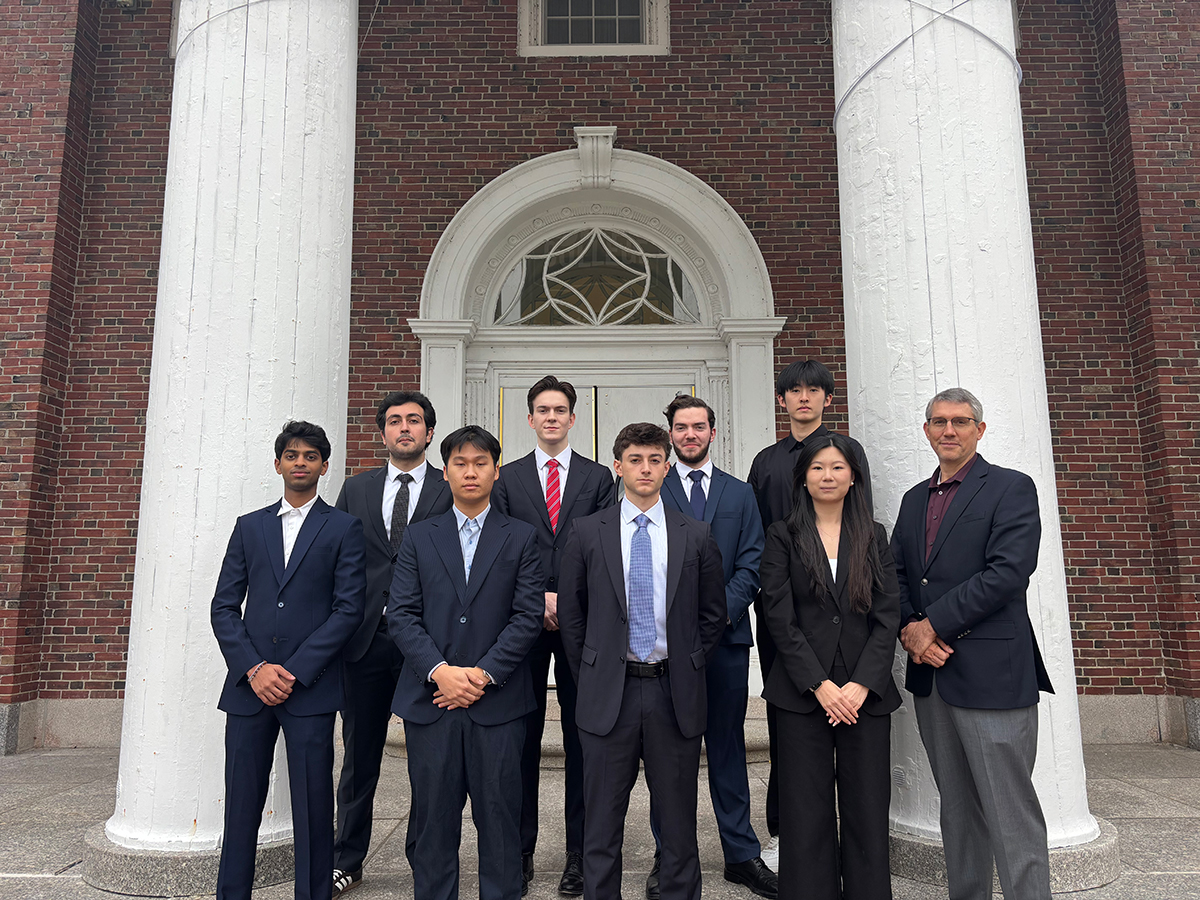 The Fed Challenge team poses for a group photo
The Fed Challenge team poses for a group photoBabson’s team, coached by Associate Professor Josh Staveley-O’Carroll (far right), advanced to the regional finals of the Boston Regional College Fed Challenge for the fourth time in the past seven years.
The Babson competition team included Ilkan Budak ’26, Ian Cass ’26, Aditya Mehta ’28, Tancrede Roy ’27, and Molly Wang ‘27. The rest of the class that helped with the slides and the script are Nick Coletti ’26, Julia Golden ’26, Ava Hascall ‘26, James Nguyen ’27, and Eric Wang ‘26.
“I am extremely impressed with the research this team conducted on extremely technical topics such as the impact of the supplemental leverage ratio on term spreads and the effects of forward guidance on inflation expectations,” said Staveley-O’Carroll, who recruits students from the Money, Banking, and the Economy course for the competition.
In the College Fed Challenge competition, students analyze the real-time state of the economy, including potential risks. Teams then present recommendations for the Federal Reserve in its interest-rate setting and conduct of monetary policy to a panel of professional economists, including those from the Federal Reserve Bank of Boston.
Babson Team Advances to Semifinals of College Fed Challenge
October 30, 2024
A team of economics students from Babson College advanced to the New England semifinals of the College Fed Challenge for the third time in the past six years.
The Babson team, coached by Associate Professor Josh Staveley-O’Carroll, excelled against 24 other colleges and universities from New England in the prestigious academic competition, hosted by the Federal Reserve. Babson won its first-round group, topping Boston University and Bryant to advance to the semifinals with Dartmouth, Harvard, UConn, Wellesley, and Yale.
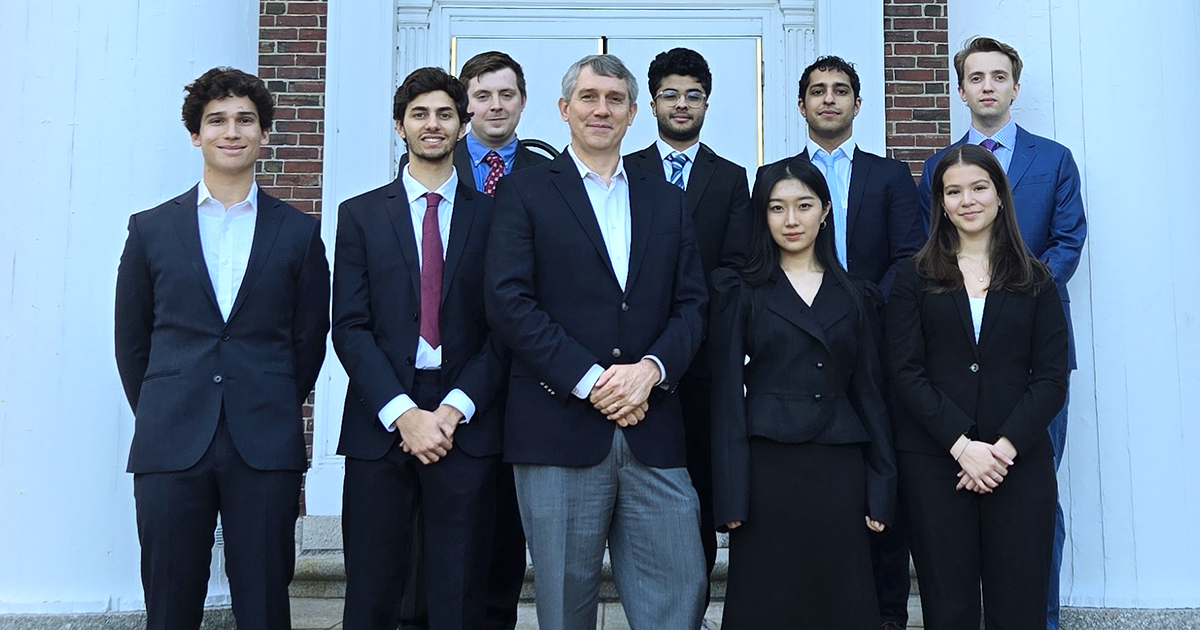 First row (from left): Hugo Murray ’27, Felipe Viseu ’25, Associate Professor Josh Staveley-O’Carroll, Kaylie Lyu ’25, Lily Gofman ’25. Second row (from left): Jack Reed ’25, Rohan Nanwani ’27, Manraj Bains ’24, and Emilio Oliva ’25.
First row (from left): Hugo Murray ’27, Felipe Viseu ’25, Associate Professor Josh Staveley-O’Carroll, Kaylie Lyu ’25, Lily Gofman ’25. Second row (from left): Jack Reed ’25, Rohan Nanwani ’27, Manraj Bains ’24, and Emilio Oliva ’25.“This is quite a feat, given the stiff competition in the New England district,” said Josh Stillwagon, chair of Babson’s Economics Division, “particularly given that economics is one of, if not the, largest major at much of the Ivy League and the top liberal arts colleges.”
As coach of the Babson team, Staveley-O’Carroll recruits students from the Money, Banking, and the Economy course for the competition. The presenters this year were Manraj Bains ’24, Lily Gofman ’25, Rohan Nanwani ’27, Emilio Oliva ’25, and Felipe Viseu ’25. Also, Kaylie Lyu ’25, Hugo Murray ’27, and Jack Reed ’25 provided analysis for the competition.
“I am incredibly proud of this year’s team,” Staveley-O’Carroll said. “In particular, the students did an excellent job of finding relevant academic research to support their economic analysis and monetary policy recommendations.”
In the College Fed Challenge competition, students analyze the real-time state of the economy, including potential risks. Teams then present recommendations for the Federal Reserve in its interest-rate setting and conduct of monetary policy to a panel of professional economists, including those from the Federal Reserve Bank of Boston.
2020 College Federal Challenge
October 16, 2020
Babson team members are Vladimir “Manny” Cadavid Dubinin, Morgan Headrick, Valentin Pascaru (not in photo), Sarah Schmider, Joao Pedro Nagao Silva, and Ethan Rosenthal. Guided by Professor Josh Staveley-O’Carroll.

Babson Fed Challenge Team Advances to Regional Finals
Friday, November 8, 2019, Federal Reserve Bank of Boston
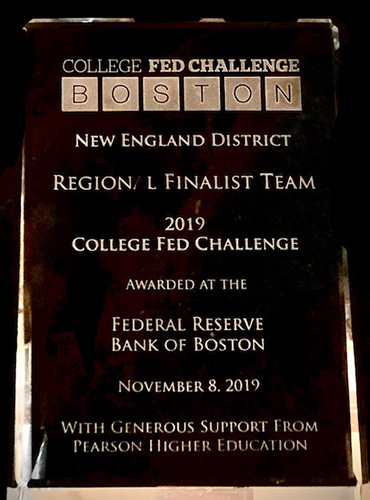
On November 8th, 2019, a team of undergraduate students from Babson College competed in the “College Fed Challenge” at the Federal Reserve Bank of Boston, along with 23 other Colleges and Universities from across New England. The College Fed Challenge is an academic competition where students present an analysis of the current state of the U.S. economy and a recommendation for the Federal Reserve in its conduct of monetary policy. Babson was one of only five schools to advance to afternoon round of the Regional Finals along with Harvard, Dartmouth, Bentley, and Middlebury.
In their first-round bracket, Babson bested Bates College, Tufts University, and the University of Connecticut to advance to the afternoon round of the Regional Finals. During the finals round, they repeated their presentation and then fielded questions from three research economists at the Boston Federal Reserve: Falk Brauning, Christopher Foote, and Vaishali Garga.
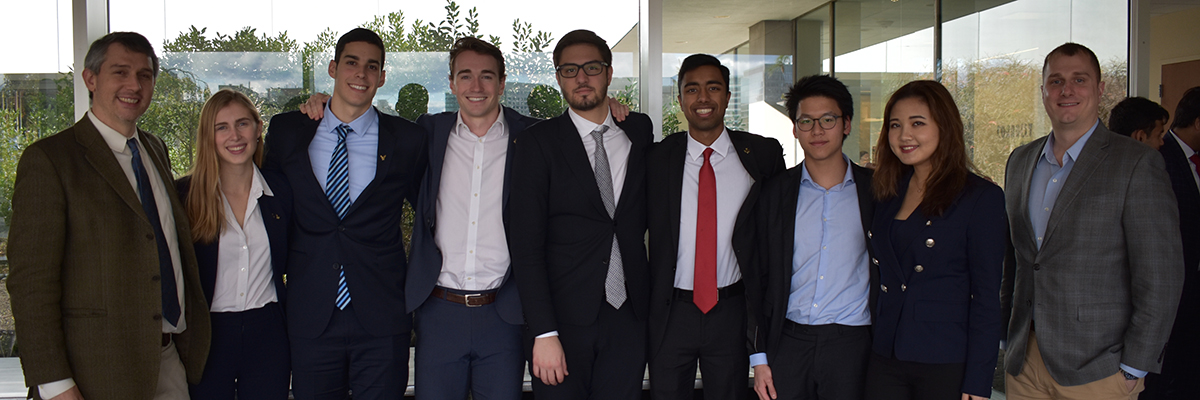
The student team included Aditya Agarwal, Isaac Darwiche, Anna Dibble, Macintyre Henderson, Rares Surugiu, and Ziyi Zhuang. Julia Lu, Rithvik Madhavarapu, Patrick Nitiratanakul, and Aob Poolvoralaks also provided research for the competition. The team was coached by Professors Josh Staveley-O’Carroll and Josh Stillwagon. This is the third year the two have coached the team together, which is now associated with a two-credit course “The College Fed Challenge.” This was the first time Babson has advanced to the regional finals going back to its initial entry in 2011.
Harvard received first place in the 2019 regional competition, with Dartmouth as the runner-up. Harvard will go on to compete at the Board of Governors in D.C. against the winners from the other participating Federal Reserve Districts.
The judges of the afternoon round, in their concluding remarks before announcing the winner, praised the Babson team’s creative recommendations and willingness to consider unconventional policy options. This seems quite fitting for Babson in highlighting the team’s “entrepreneurial thought.”
2018 Federal Reserve Challenge
Monday, October 29, 2018, Federal Reserve Bank, Boston, MA
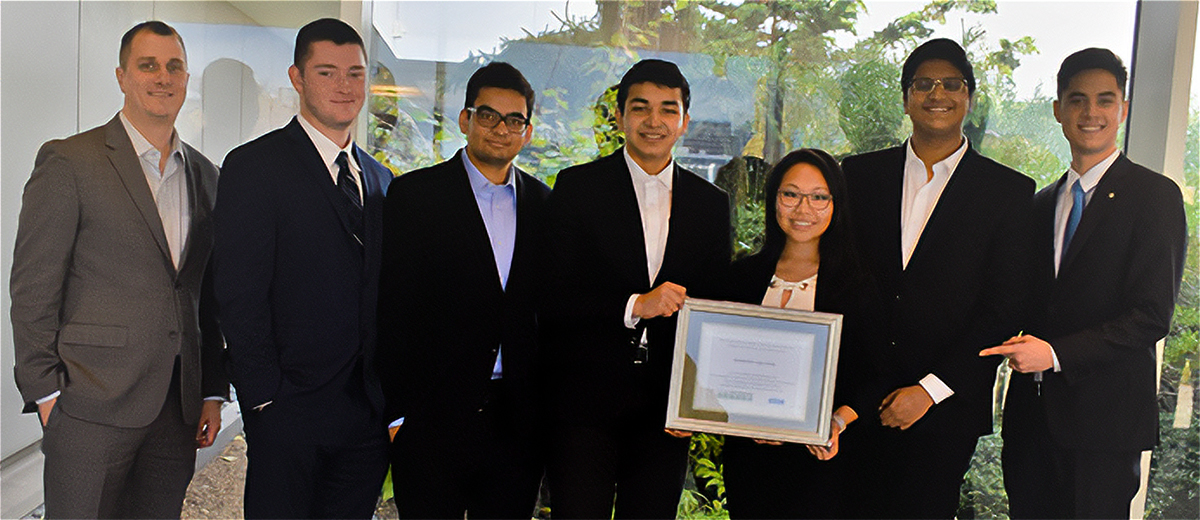 Left to right: Professor Josh Stillwagon, Charles Ramsland, Arun Afzali, Ashish Tejpal, Shanshan Li, Anay Gawande, and Peter Pham
Left to right: Professor Josh Stillwagon, Charles Ramsland, Arun Afzali, Ashish Tejpal, Shanshan Li, Anay Gawande, and Peter Pham2017 Federal Reserve Challenge
Friday, November 3, 2017, Federal Reserve Bank, Boston, MA
On November 3, 2017, four Babson students (Leni Benacerraf, Camila Rioseco, Grant Smith, and Chelsea Yasgur) competed in the 2017 Boston Regional Fed Challenge competition. 22 colleges from across New England were represented this year at the Federal Reserve Bank of Boston. The Fed Challenge is an academic competition where each team presents an analysis of the current state of the U.S. economy, provides a recommendation for monetary policy, and then fields questions from professional economists. The Babson team, coached by Professors Staveley-O’Carroll and Stillwagon, scored an 83.5; just two points shy of the winning team in their bracket (Yale), and 23 points above the lowest scoring team.
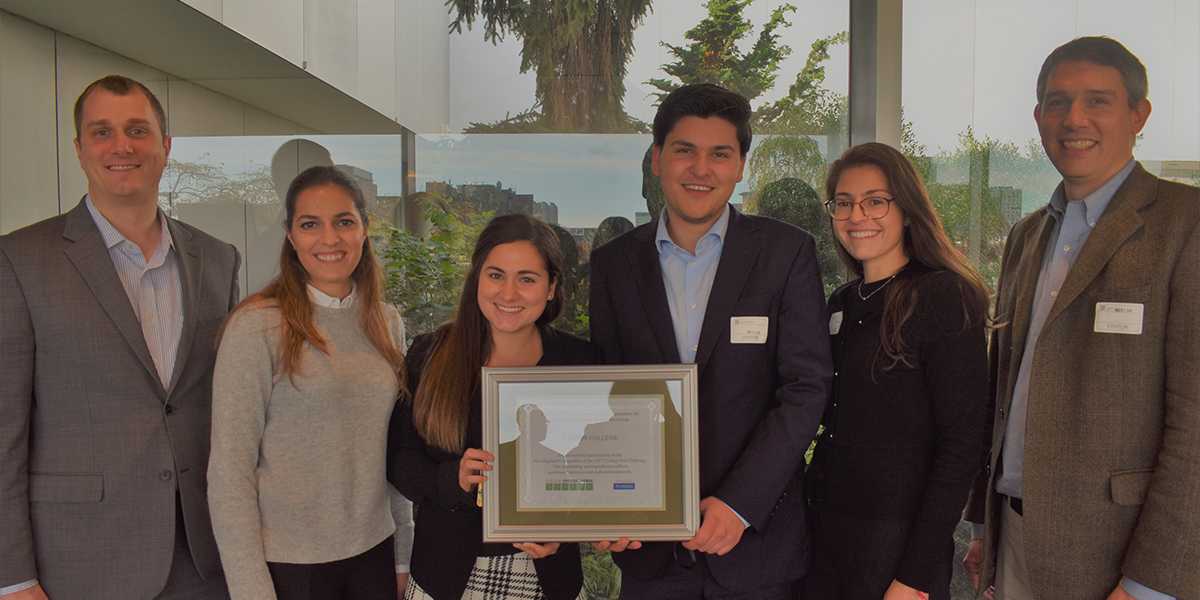 Photo: L-R: Professor Josh Stillwagon, Leni Benacerraf, Camila Rioseco, Grant Smith, Chelsea Yasgur and Professor Josh Staveley-O’Carroll (photo credit: Deb Bloomberg)
Photo: L-R: Professor Josh Stillwagon, Leni Benacerraf, Camila Rioseco, Grant Smith, Chelsea Yasgur and Professor Josh Staveley-O’Carroll (photo credit: Deb Bloomberg)2014 College Federal Challenge Competition
Federal Reserve Bank of Boston, Boston, MA
November 7, 2014
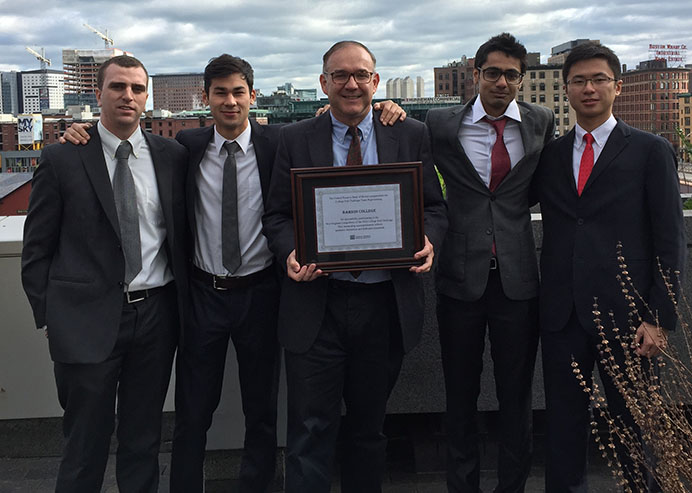
According to Professor Chartier, “19 colleges and universities competed in the regional challenge including Harvard, Dartmouth, BU, BC, Bently, Bryant, Tufts and Middlebury.” He added, “the students thoroughly enjoyed the experience.”
Babson College Team competing in the 2014 Fed Challenge from left to Right: Matt Hayes (Senior), Roy Murdock (Senior), Professor Frederic Chartier (Advisor), Shaan Shah (Junior), Hsing-Han (“Hank”) Huang (Sophomore). Not in photo are Felipe Mellao (Senior), and Professor Nestor Azcona (Advisor).
College Federal Challenge Competition, 2012
November 9, 2012, Federal Reserve Bank of Boston, Boston, MA
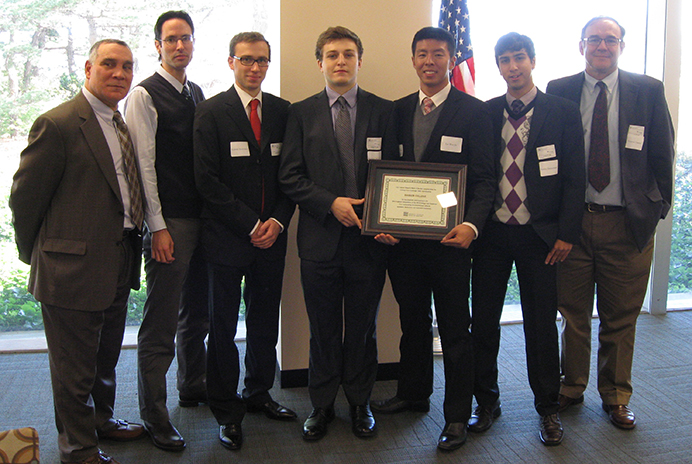
Babson College Team competing in the 2012 Fed Challenge (Regionals)
Left to right: Federal Reserve Director of Economic Education, Professor Nestor Azcona (faculty advisor), Gabriel Breitenstein, Brendan Metcalf, Gerald Lee, Sanjay Zimmerman, Professor Frederic Chartier (Faculty Advisor)
College Federal Challenge Competition, 2011
November 9, 2011, Federal Reserve Bank of Boston, Boston, MA
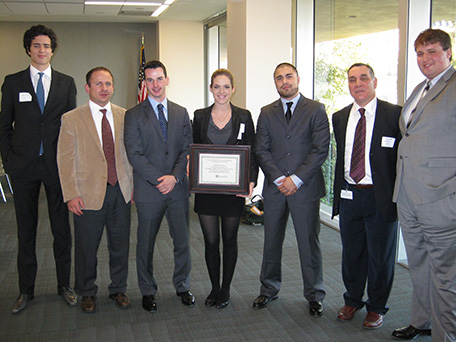
On November 9th a team of six Babson students participated in the Fed Challenge Competition. This is an academic competition for college undergraduates that promotes in depth analysis of the Federal Reserve’s monetary policy decisions in relationship to the US Macro economy. Babson’s visiting Professor Alexei Orlov helped the Babson crew, consisting of Joseph Blundo, Kirsten Daley, Andreas Hwang, Pierre Keusseyan, Bashar Lazaar and Mark Maclay, prepare for their presentation. While the Babson team didn’t qualify for one of the top four spots, Professor Orlov felt that our students represented the College with the flying colors and did a terrific job on their analysis of current economic conditions and in their recommendation for for Fed monetary policy. By all accounts students really enjoyed the experience of competing with teams from the best colleges in the New England. According to Babson senior Mark Maclay, “We all worked hard and pushed ourselves to learn more, think more, and push the limits of our knowledge and understanding of the most complicated concepts in economics.”